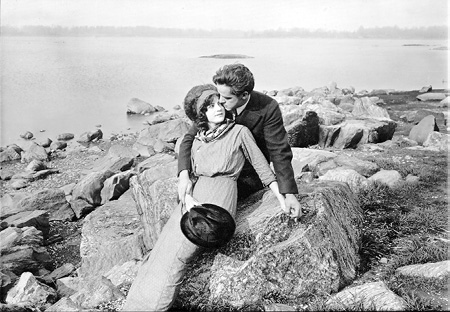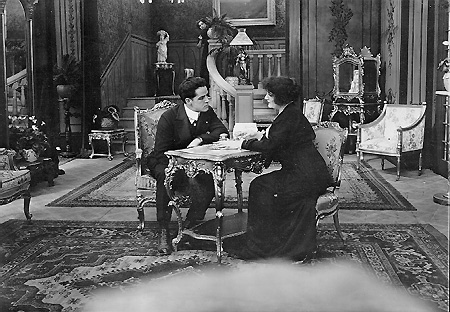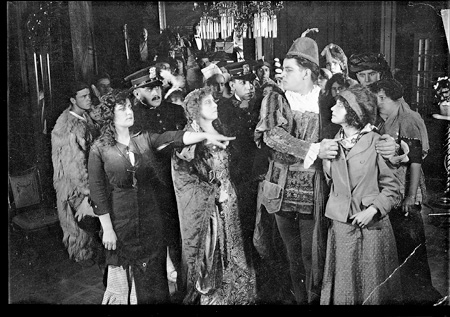 Volume II: Filmography
Volume II: Filmography Volume II: Filmography
Volume II: Filmography



Production stills from Peggy's Invitation with Marguerite Snow and William Russell. (F-1170-1, F-1170-2, F-710)
December 16 1913 (Tuesday)
Length: 1 reel (1,016 feet)
Character: Drama
Director: James Durkin
Scenario: Lloyd F. Lonergan
Cast: Marguerite Snow (Peggy O'Neil, the poor girl), Carey L. Hastings (Mrs. Horatio Vanderlee, a society woman), Lila Chester (Gracia, her daughter), William Russell (Henry Farland, a young banker), N.S. Woods (butler), Justus D. Barnes
Note: Marguerite Snow, pregnant (although no publicity was given to this), had been on a leave of absence since May 1913, when Thanhouser's West Coast Company had returned to the East. After being away for six months, during which time she gave birth to a daughter, Julie, she returned to the studio and acted in this film.
SYNOPSIS, The Cinema, March 12, 1914:
"Peggy was a poor fisherman's daughter, and her life was without the numerous parties and social affairs that were part of the lot of the more fortunate; but she was as anxious to enjoy life as the majority of pretty girls. A mother and daughter in better circumstances were endeavouring to persuade a wealthy young bachelor that the daughter's charms were unequalled. In order to further convince the young man, they gave a fancy dress ball, the invitations being sent out typewritten on the inside of masks. The butler was given the job of delivering them, and on the way accidentally dropped one. Peggy came along and found it, and after some deliberation determined to take the risk and attend the ball attired as she was in her ordinary clothes. Now previous to the affair the daughter confided to the young bachelor the fact that she would be disguised as a beggar maid. But when the affair came off the young man mistook Peggy for the daughter, and made ardent love to her all the evening, much to the real daughter's discomfort. At midnight everybody unmasked. The butler recognised the imposter and informed his young mistress. The mother suddenly missed her diamond brooch, so the daughter in revenge sent for the police. The young man, however, had now become infatuated with Peggy's charms, and gallantly defended her against the daughter's accusation that the fisherman's daughter was a thief. The brooch was soon found, and Peggy's innocence established. The young bachelor did not lose sight of the young lady after the ball, and eventually won her to the great annoyance of the wealthier girl. (Released April 6th. Length 1,016 feet.)"
SYNOPSIS, The Moving Picture World, December 20, 1913:
"A society woman who lives in a suburb near the sea had laid her plans to insure the marriage of her daughter to a wealthy young banker. The banker accepted an invitation to spend the weekend at her home, and was also to be one of the guests at a masquerade party the mother was to give. To secure novelty the woman, instead of issuing regular invitations, had them printed on the back of masks, so that each guest would bring his mask and invitation at the same time. The servant, whose duty it was to distribute the invitations, lost one of them and did not discover it until later. The lost invitation was found by a poor fisher girl, who, yielding to sudden impulse, donned the mask on the night of the party and freely mingled with the other guests. It happened that the daughter of the house had hoped to secure the attention of the young banker, and she told him that she had arranged to be dressed as a beggar maid. This led to a natural mistake and the banker devoted all of his time to the real beggar maid, with whom he fell more and more in love. His mistake was not discovered until the guests unmasked at midnight, and then a servant told the society girl that the fisher maid had obtruded there uninvited. At the same time the girl's mother claimed that she had been robbed of one of her jewels and suspicion naturally fell upon the poor girl. The young banker warmly defended her and by his action won her love and gratitude. The society girl soon found that her plans to marry the banker had utterly failed, for in the course of time the rich man and the girl became man and wife."
SYNOPSIS, Reel Life, December 13, 1913:
"A poor, but very beautiful, fisher-girl proves the Cinderella of the great event of the Shellpoint season. Mrs. Horatio Vanderlee, the eminent society leader, whose summer home is at Shellpoint-by-the-Sea, gives a ball masque, and invites a rich young banker down from New York - for the special purpose of bringing about a betrothal between her daughter and the 'catch' of their social circle. Aspiring to be unique, she writes the invitations on the inside of the masques, and has her butler deliver them at the homes of her guests. One of the masques is lost and Peggy O'Neil, a fisher-girl, finds it. At the ball, Farland falls in love with Peggy - and at the unmasking the intruder is discovered. That night Mrs. Vanderlee loses a diamond brooch, and Peggy is accused of stealing it. The young banker defends her - love deepens between them - and the fisher-girl marries the prince."
REVIEW, The Morning Telegraph, December 21, 1913:
"There is not much question about the willingness of a young millionaire to marry a humble fisher girl, provided the girl was Marguerite Snow, and such is the case in this story. So it is hardly surprising that the 'catch' decides on the girl about five minutes after he meets her. Mrs. Vanderlee gave a masked ball for the express purpose of introducing her daughter to the wealthy youth. Peggy, the fisher girl, obtained an invitation by accident and decided to take a chance and go. This badly upset Mrs. Vanderlee's plans, as the young banker hardly noticed the daughter at all. When the unmasking took place Peggy was discovered and shortly after charged with theft by the enraged Mrs. Vanderlee. Her rich lover defended her, and in a short time they were happily married, leaving Mrs. Vanderlee to ponder on the uncertainties of life."
REVIEW, The Moving Picture World, December 27, 1913: This review is reprinted in the narrative section of the present work.
REVIEW, The New York Dramatic Mirror, January 14, 1914:
"A one-reel drama, the general idea of which is excellent. In the working out of the plot, the director is not so fortunate, for a good deal of the incidental action seems to be little more than well-disguised padding, action being started and finished with apparently no effect on the climax. There is very little, but a good interest in this story, which takes a love affair as in the natural order of things. The masquerade ball was vivacious. Marguerite Snow as the girl gives a charming representation of a beggar girl, and surpasses her own individuality to that of the character she assumes, with marked success. The story is about the daughter of a poor fisherman, who finds an invitation to a masquerade dance, and goes for the adventure of it. There she meets a rich young man who falls in love with her and soon they are engaged."
# # #
Copyright © 1995 Q. David Bowers. All Rights Reserved.